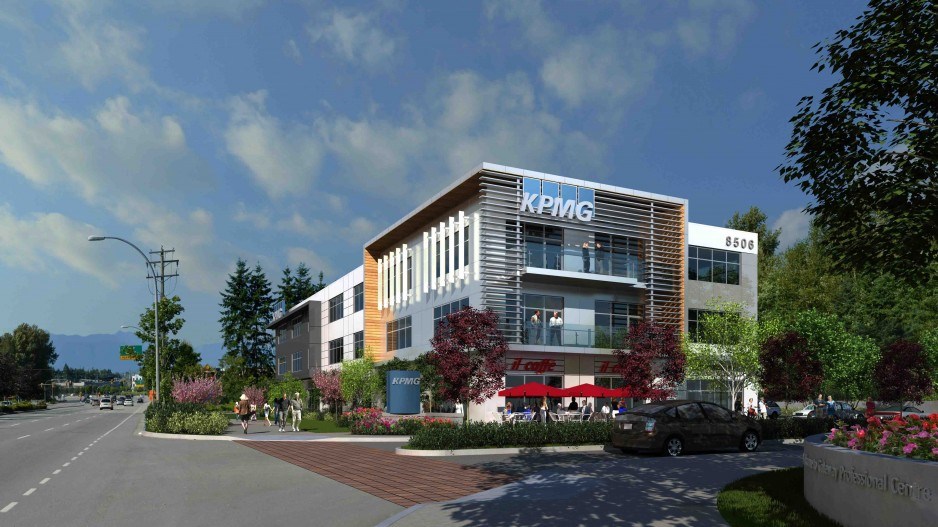Dense topic
A draft of Metro Vancouver’s pending report on the region’s industrial lands will be the starting point for a discussion the Planning Institute of B.C. (PIBC) will host October 23 regarding densification of industrial lands.
The final report will be presented November 9, but the draft indicates that of approximately 28,200 acres of industrial land in Metro Vancouver, more than 21,600 acres have been developed – leaving approximately 6,600 acres available for development.
“There’s a finite amount that’s left,” said Gaëtan Royer, manager of metropolitan planning, environment and parks, for Metro Vancouver. “If we continue to build single-storey, tilt-up concrete warehouses we’re going to run out ... somewhere between 2020 and 2024.”
To counter the shortage, Royer looks forward to discussing – and hearing – options for the densification of industrial land use now rather than waiting till the land runs out.
“The meeting with PIBC is very much part of information gathering,” he said.
While density may take the form of multi-level industrial buildings or more complete site coverage rather than the 40% that’s common at some logistics facilities, Royer said Metro Vancouver is open to considering alternative measurements of density, including jobs or “economic through-put” per acre.
While he’s open to the densification of industrial sites, panellist Chris MacAuley, a vice-president specializing in industrial properties with CBRE Ltd., doesn’t believe all properties are ideal for additional density.
He’s also concerned that the shortage is more acute than Metro Vancouver’s report indicates, a point he expects to be raised in a report commercial real estate association NAIOP plans to release in January.
MacAuley said he’s handling a million-square-foot project in Delta that will have 36-foot ceilings, but there are just five sites in the Lower Mainland that could accommodate similar, large logistics facilities. And it’s anyone’s guess how much land is available for immediate industrial development.
“We need to look at how we’re going to accommodate this,” he said. “We’ve already lost a couple of large multinational tenants to other provinces because we don’t have options for them.”
Langley action
KPMG announced the development of new premises in Langley on October 19, the first of three buildings at the 60-acre master-planned commercial precinct Wesgroup Properties Ltd. has been developing over the past decade.
The site of a former Salvation Army summer camp on 200th Street, the property was first developed a decade ago as Gateway 200, then relaunched last week as Gateway Enterprise Park. KPMG will occupy a 34,000-square-foot building scheduled to be completed next year as part of a 4.5-acre professional campus Wesgroup is developing at 84th Avenue with a mix of smaller premises. Gateway Park West will host larger buildings. Current occupants of the park include the head offices of the Fraser Health Authority, Pharmasave Drugs (National) Ltd. and the BC Government Employees Union. Situated minutes from Highway 1 in a rapidly growing commercial area, Wesgroup acquired the site a decade ago to capitalize on its highway connections. The investment paid off, capitalizing on growth in the Carvolth area as well as construction of the Golden Ears bridge that connects the area to industrial areas north of the Fraser River.
Wesgroup president Peeter Wesik and KPMG regional managing partner Jonathan Kallner were unavailable to comment on the project prior to its launch.
With a number of initiatives under way – from completion of FedEx’s new facility at Pacific Link Business Park in Surrey to welcoming TransLink to its new headquarters in New Westminster’s Brewery District – there will be fresh opportunities to catch up with Wesik before too long.
Slowing trend
Declining sales and falling prices are moderating the torrid pace of the B.C. real estate market, with the latest report from the B.C. Real Estate Association last week noting that the average price of resale properties in the province is down 5.6% from a year ago.
That’s no surprise to David Podmore of Concert Properties Ltd., who told an audience at the recent Western Canadian Hotel and Resort Investment Conference that the long-term outlook is good for B.C. real estate but the next two years might be slow.
“I think we’re going to go through a couple of years here where it’s going to be a relatively flat market,” Podmore said, “particularly on condominium development, and probably a stabilizing of land values.”




